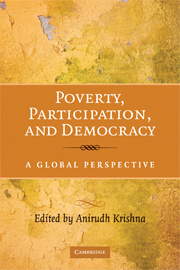Book contents
- Frontmatter
- Contents
- Preface
- Contributors
- Poverty, Participation, and Democracy
- 1 Introduction: Poor People and Democracy
- 2 Poor People and Democratic Citizenship in Africa
- 3 Do Poor People Care Less for Democracy? Testing Individual-Level Assumptions with Individual-Level Data from India
- 4 Inequality and Democracy in Latin America: Individual and Contextual Effects of Wealth on Political Participation
- 5 The Poor and the Viability of Democracy
- 6 Conclusion: Implications for Policy and Research
- Bibliography
- Index
5 - The Poor and the Viability of Democracy
Published online by Cambridge University Press: 14 May 2010
- Frontmatter
- Contents
- Preface
- Contributors
- Poverty, Participation, and Democracy
- 1 Introduction: Poor People and Democracy
- 2 Poor People and Democratic Citizenship in Africa
- 3 Do Poor People Care Less for Democracy? Testing Individual-Level Assumptions with Individual-Level Data from India
- 4 Inequality and Democracy in Latin America: Individual and Contextual Effects of Wealth on Political Participation
- 5 The Poor and the Viability of Democracy
- 6 Conclusion: Implications for Policy and Research
- Bibliography
- Index
Summary
Introduction
This chapter begins where others have ended, namely, with the finding that poor people differ little in their attitudes toward democracy, their political values, and in the actual rates of electoral participation from those who are better off. Even if they may be more likely to see democracy in instrumental terms, the poor value democracy and participate in democratic politics. What do these facts imply for the viability of democracy?
How could the poor threaten democracy? We need to distinguish three possibilities:
First, by not participating. Democracy is anemic and vulnerable when participation is low. Indeed, we commonly read low rates of turnout as indications of a crisis of democracy, as weakness of “diffuse support” (Easton 1968) for democratic institutions. The causal mechanism typically entailed here is that when the poor do not participate, they may end up exploding in the form of peasant revolts, ghetto riots, millenarian movements, and so on.
Second, by participating while being vulnerable to authoritarian appeals. The prototype of this scenario was the 1851 plebiscite in France, in which poor peasants supported the coup of Louis Napoleon. The specter that haunted American political science during the cold war was that when the masses of the poor become politicized, they are vulnerable to extremist, read communist, appeals. This was the great fear of participation in the 1960s (Almond 1954; Huntington 1968; Shils 1965).
- Type
- Chapter
- Information
- Poverty, Participation, and DemocracyA Global Perspective, pp. 125 - 146Publisher: Cambridge University PressPrint publication year: 2008
- 11
- Cited by



